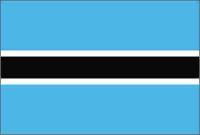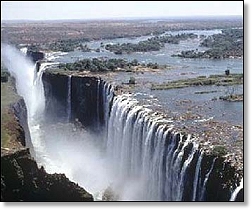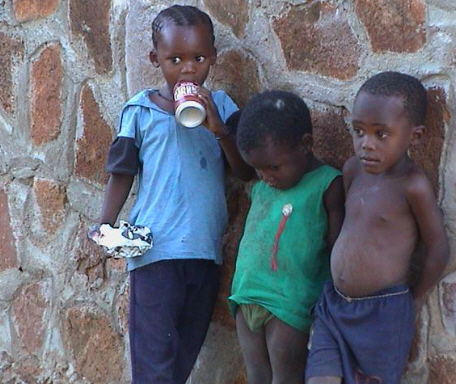| |


The Republic of Botswana (Lefatshe la Botswana) is a landlocked nation in Southern Africa. Formerly the British protectorate of Bechuanaland, Botswana adopted its new name after becoming independent within the Commonwealth on September 30, 1966. It is bordered by South Africa to the south, Namibia to the west, Zambia to the north, and Zimbabwe to the northeast. The economy, closely tied to South Africa's, is predominated by mining, especially diamonds; cattle; and tourism.
Botswana is among the countries hardest hit by HIV/AIDS. In 2003 there were an estimated 350,000 people living with HIV. This, in a country with a total population below two million, gives Botswana an adult HIV prevalence rate of 37.3%, the second highest in the world after Swaziland.
Life expectancy at birth fell from 65 years in 1990-1995 to 39.7
years in 2000-2005, a figure about 28 years lower than it would have
been without AIDS. There were around 160,000 orphaned children
living in Botswana in 2003, more than three quarters of whom had
lost a parent to AIDS.
Botswana was the first African country to aim to provide antiretroviral therapy to all its needy citizens. Many believe that if anywhere in Africa is going to succeed in implementing such a comprehensive HIV/AIDS care and treatment programme, then it is Botswana.
HIV prevention
There are a number of different types of HIV prevention programmes currently taking place in Botswana. These include:
Public education & awareness
Education for young people
Condom distribution & education
Targeting of highly mobile populations
Improvement of blood safety
Prevention of mother to child transmission of HIV (PMTCT)
Public awareness and education has previously been based on the "ABC" of AIDS: Abstain, Be faithful and, if you have sex, Condomize. Botswana has safe-sex billboards and posters everywhere, but it is unclear whether anyone pays attention.
The country has been bombarded with HIV messages, but there hasn't been a change in behaviour. So now the aim is to target the right message to the right people. One recent initiative has been the development of a radio drama, Makgabaneng, dealing with culturally specific HIV/AIDS-related issues and encouraging changes in sexual behaviour. Another initiative has involved workplace peer counselling, including the development, piloting and distribution of a facilitator's manual. And HIV education has been taken to people's doorsteps by the Total Community Mobilization programme.

Full country name: Republic of Botswana
Area: 600,370 sq km
Population: 1.6 million
People living with HIV/AIDS: 350,000
People: Batswana 60%, Bakalanga, Basarwa, Bakgalagadi
Language: English, Setswana
Religion: Christian 71.6%, Badimo 6%, other 1.4%, unspecified
0.4%, none 20.6%
Government: parliamentary republic
Head of State: President Festus Mogae
Major Industries: diamonds, copper, nickel, coal, salt, soda ash, potash, livestock processing, sorghum, maize, millet, pulses, groundnuts (peanuts), beans, cowpeas, sunflower seed, livestock
Major Trading Partners: EU, Southern African Customs Union (SACU), Zimbabwe

|
|

